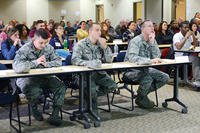The Accurate use of Terms is Imperative
It is popular today to join in the lively discussion on for-profit education and the military. I am troubled when I hear elected officials and read stories about this subject. It is far too common for people to erroneously use the terms 'for-profit', 'distance learning' and 'online' as synonyms -- these are distinct and very different concepts.
Why do people continually use the terms interchangeably? Ironically, it could simply be a case of needing more education on the subject of education.
Let's look at them individually:
Distance Learning (i.e. learning at a distance) is another name for a course that is taught in person in a geographic location other than a main campus (such as classes on military bases, or at a satellite location). It also connotes correspondence courses. The pioneers of correspondence courses for college level learning were the University of Chicago and the University of Wisconsin. Both started offering college level courses at a distance before 1900.
As far as the military education, distance learning college courses became very popular in World War II, and more than a million GIs took some kind of correspondence course during the war. For more than 30 years, The U.S. Armed Forces Institute (USAFI) coordinated college level correspondence courses, partnering with hundreds of colleges and universities. The University of Maryland was a pioneer in offering courses at distant locations serving military members, and offered its first course in that format in 1942.
Online learning does not pertain to only for-profit education. Actually, more public and private universities offer online courses than for-profit schools. The term probably became synonymous with for-profits because of the growth and size of the University of Phoenix, which was a pioneer in this delivery method. This does not warrant using the terms interchangeably.
One can see that military members find online learning to be very accommodating due to the transitory nature of their duties. Many public and private, nonprofit universities offer online programs and have thousands of military members enrolled.
For-profit institutions come in all shapes and sizes. Some are training schools, some are career colleges, and some offer doctoral degrees online or on-campus. Many are regionally accredited (just like public and private nonprofits), meaning they have to face the same scrutiny as those institutions. Actually most of the teams that conduct accreditation visits, (i.e. an inspection, if you will) are made up of public and nonprofit private institutional faculty members.
Some for-profits are publicly traded corporations, but many are privately owned and operated.
There are several points to consider surrounding this topic:
Painting with a broad brush is dangerous. Here is a good comparison: Recently, both the University of Miami and the Ohio State University came into some questionable practices with regard to their student athletic programs. They were investigated for violating NCAA rules. That did not generate headlines like "NCAA institutions are cheaters!" or, "NCCA schools conduct illegal activities." Why did we not see these headlines? Because not ALL NCAA schools are guilty. Therein lays the issue. To say that "All for-profit institutions are corrupt," is a misnomer.
Call out the 'bad eggs'. When violations or exploitive practices are uncovered, I think it is imperative to name the institutions.
Questioning the quality of distance learning or online learning conflicts with good research results. The evidence is in and these modalities of learning are just as effective and sound as taking classes on a main campus. I think the issue here is because online learning is relatively new, some think it is a short cut to a degree. Many times, the demand of time and workload is more difficult!
It is not the job of the Department of Defense to scrutinize the credentials of higher education. Their mandate is to verify that a college or university is recognized by an agency that is approved by the Department of Education. The process for validation of program quality falls on the agency recognized by DOE. If the process is broken, address the process, not the current participants who have no control of the process.
It behooves those who are leading our country and those writing about events in our society to do their homework. I hope this helps to clarify that these terms are not equal and that it is vital to accurately use descriptors, especially on a subject as crucial as this one.
The Degree to Take You There
Your next step is to select the degree that matches your career goals and offers the flexibility you need.





